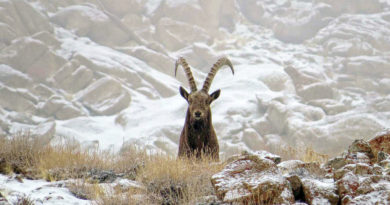Wildlife, Wildflowers & Hidden Wonders
Bison, pronghorn and elk amble across Yellowstone’s grasslands. Aspens and willows speckle the forests of pine, spruce, fir and juniper, which shelter grizzlies, black bears, coyotes and gray wolves in their depths, along with three cat species: lynx, bobcats and cougars. Thermal features found here include hot springs, mudpots, fumaroles, travertine terraces, steam vents and famed geysers. And while treasures abound, beyond national park boundaries the Greater Yellowstone Ecosystem extends far into the Northern Rockies, encompassing 34,000 square miles.

Wildflowers bloom around hot springs in Yellowstone’s Upper Geyser Basin.
Yellowstone’s Native American Heritage
Yellowstone is America’s oldest and perhaps most beloved national park, inspiring innumerable written accounts of exploration and bringing in an influx of tourism each year. But even before this remote region attracted millions of visitors, Yellowstone had an extensive history of human occupation dating back to the Little Ice Age. Over the course of thousands of years, Native Americans conducted medicinal and religious ceremonies at hydrothermal sites, hunted in the lodgepole pine forests, fished cutthroat trout from the rivers, gathered plants and berries, quarried obsidian and engaged in trade. Today, 27 tribes have historic ties to Yellowstone, including the Mountain Shoshone, who made this land their permanent home.

A black bear feeds on flower petals in Yellowstone National Park. The Greater Yellowstone Ecosystem is one of the few places in the U.S. where black bears and grizzly bears coexist.
Wildflower Season in Yellowstone National Park
The Yellowstone is a wild-flower garden. Wander where you will, you have the ever-new charm, the finishing touch, the ever-refreshing radiance of the wildflowers.
—Enos Mills, Your National Parks, 1917
Hundreds of species of wildflowers blanket the prairies and mountain valleys in the summer. This showy display is nothing short of spectacular, with sweet-smelling meadows full of evening primroses and the white blossoms of thimbleberry and baneberry bushes. Lupine, coralroot orchids and arnica grow under the forest canopy and colors splash the slopes with larkspur, paintbrush, delicate ladyslipper, woodland star, ladies’ tresses, yellow violet, bluebell and forget-me-not. Many of these wildflowers are a critical food source for wildlife—grizzly bears dig for the bulbs of yellow glacier lilies and spring beauty, ground squirrels collect wild strawberries and important pollinators such as hummingbirds, butterflies and bees rely on the flowers’ nectar, seeds and pollen. New blooms appear each week during these savored summer months, an ever-changing rainbow for travelers from around the world to admire before the autumn frost arrives in the Lamar and Hayden valleys.

There are an estimated 728 grizzly bears in the Greater Yellowstone Ecosystem.
In Search of Yellowstone’s Wildlife
On a scenic float trip through the Grand Tetons, take in the view of the all-encompassing sky and the painted mountain peaks, which change in hue from dawn to dusk. Look for osprey fishing from the Snake River, along with moose, beaver and river otters. Near Mount Washburn, search for bighorn sheep and mountain goats in the steep canyons and bald eagles soaring overhead. Spend several days exploring Lamar Valley, a refuge for gray wolves, grizzly bears, elk and bison in the park’s remote northeast corner.

A bull elk rests amongst marigolds and lupines in Yellowstone National Park.
Stay in the Heart of Yellowstone
Guests on this adventure will sojourn at historic lodges and cabins located in the heart of Yellowstone. Enjoy sweeping views of the Teton Range at dinners that feature local and sustainable fare such as stream-caught trout, garden-raised greens and summer berries. Travelers recount tales of the day under a night sky of countless stars, wind mingling with the fragrant scents of sagebrush and smoke from a crackling fire. Fall asleep in cozy, pine log beds where you can keep warm with down comforters, before rising for another day of adventure.

A meadow of arrowleaf balsamroot flowers and the peaks of the Grand Tetons bathed in rosy alpenglow.
If you are looking for a Yellowstone trip where excursions reveal elusive wildlife and natural wonders, search no further. Our journey through Yellowstone is a trip for the true wanderer, embracing the spirit of remote nature travel. This adventure stands apart from the typical park tour, delving deep into Yellowstone’s wilds. Immerse yourself in the unknown and join Natural Habitat Adventures on a Hidden Yellowstone & Grand Teton Safari.
About the author: Emily Goodheart View all posts by Emily Goodheart
Emily is a Content Marketing Manager at Natural Habitat Adventures with a background in cultural anthropology and wildlife conservation. She has explored more than 20 countries, including Nat Hab trips to Tanzania and the Arctic, a wildlife-focused gap year in South Africa and Zimbabwe, a Nat Geo student photography expedition to the Galapagos, and Colorado College courses in Italy and India where she wrote about foodways and folklore.





